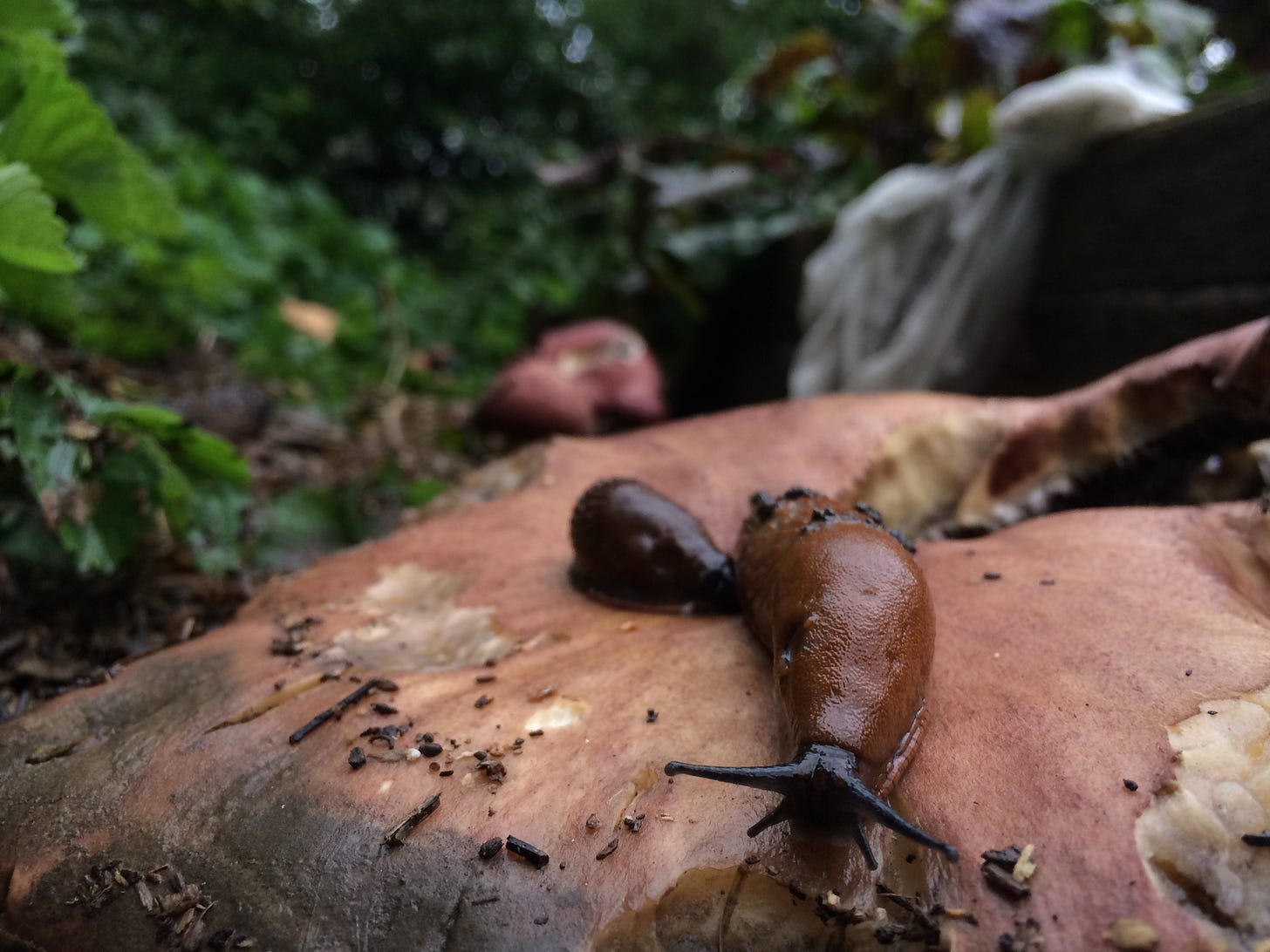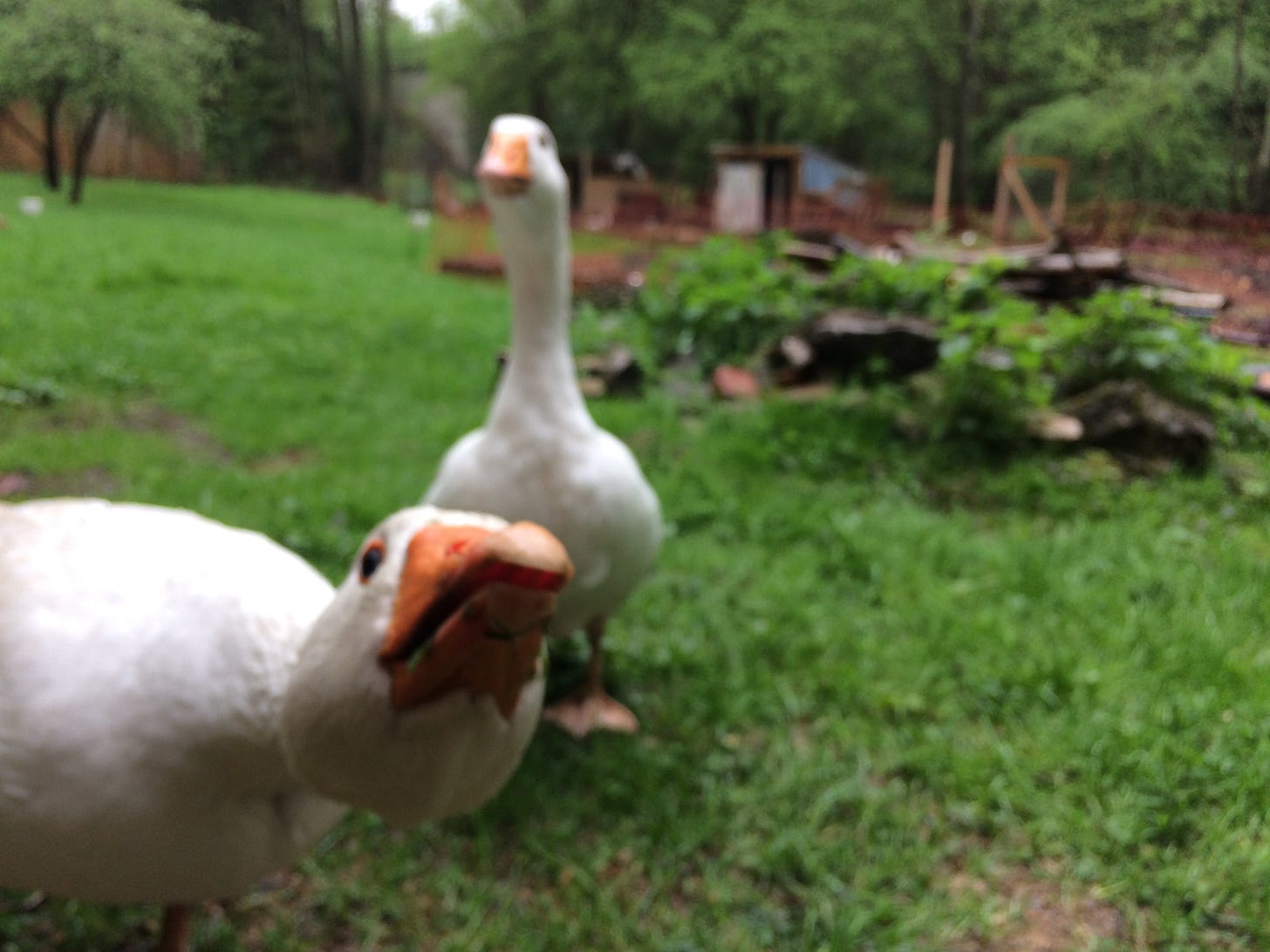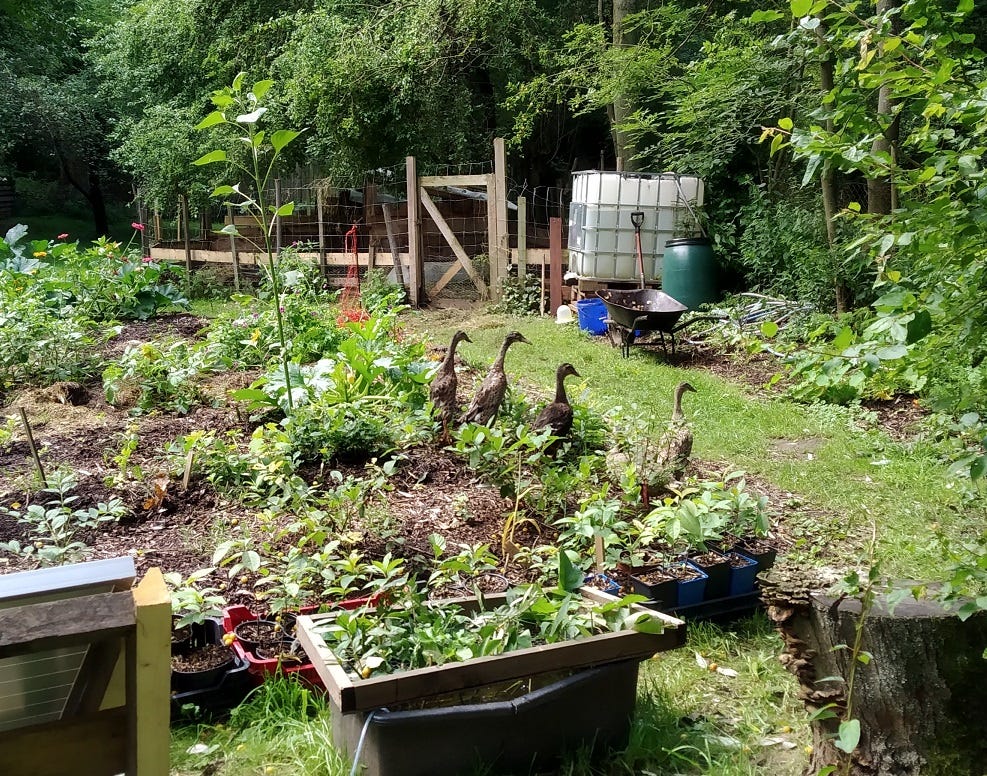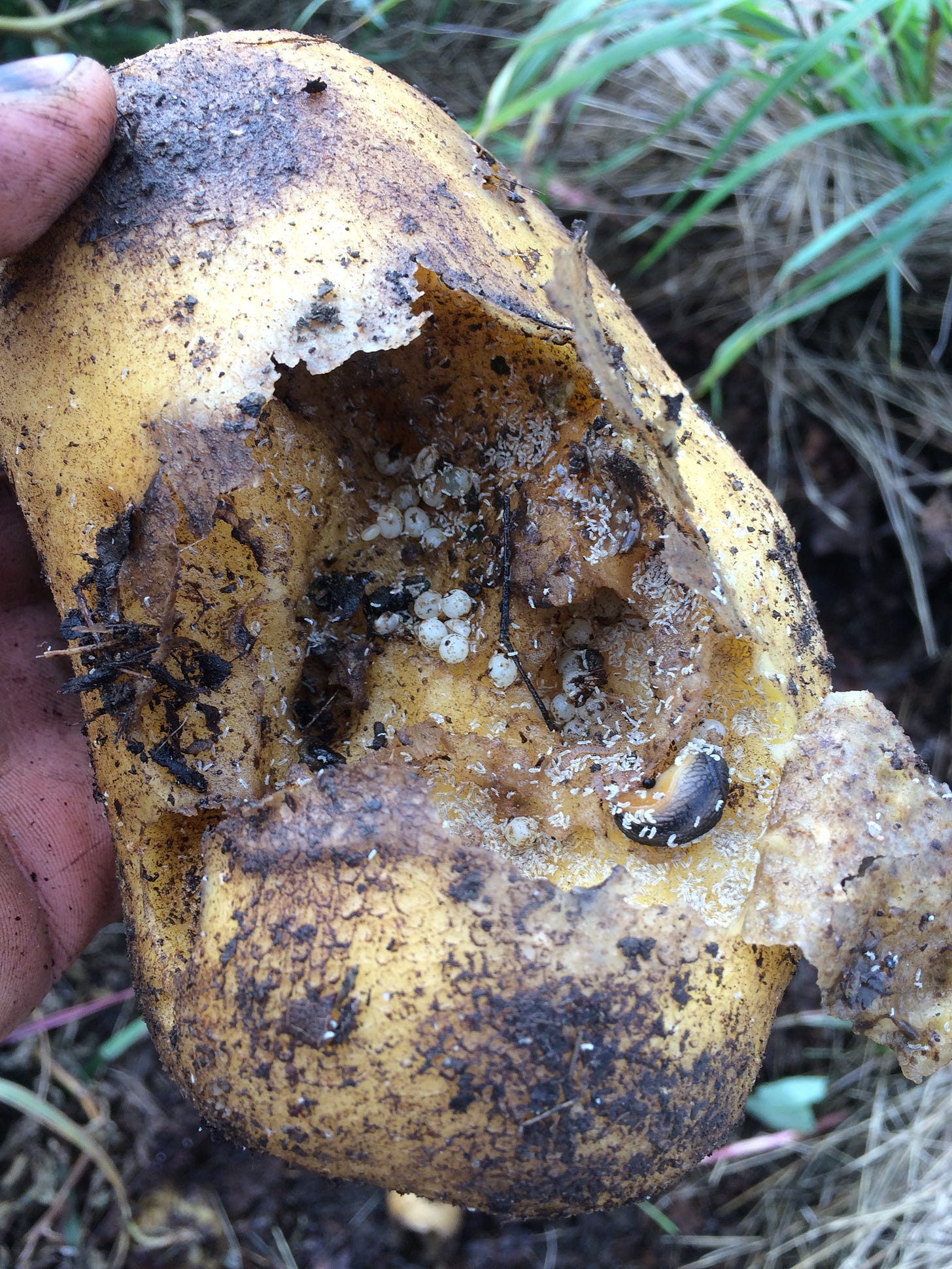February 5, 2022
A lone duck belts out a somber quack.
My eyes open. The sun is just beginning to chase the night away. Though you can hardly tell down in Prokop’s Valley. I roll on my side and try to go back to sleep.
Now the whole choir starts up. I turn over. Lucie’s still sleeping. I swing my legs over the edge of the loft and slide down the ladder.
Floor’s cold.
Open the latch on the stove, rake the ashes through the grate with the shovel–crumble paper, small log of pine on the left side, paper wedged against it. Make a lean-to of tinder, split fine.
Drag a match, blinding flash. Stick the match under paper. Close the door, and open the ash drawer to create a draft.
The geese join the chorus.
Fire catches. I feed it larger sticks. Give it a few seconds then add a log.
Toss on a coat, open the front door, turn around like a scuba diver and step down backwards into rubber boots. Three and a half seconds until the door swings back on my fingers holding onto the frame for balance. I wiggle into the boots just in time.
Head down the porch, under the blue spruce, and across the yard. Ducks first. I open the door of their house and they parade out. The last one, we call her Blondie, a little squatter than the rest who doesn’t mind having me close by, she stops and gives me a few squawks to make sure I’m aware that she’s very hungry.
They waddle quickly to the buckets for a drink, stretching their feathers, wings spread like a Chinese shan.
Mr. Goose greets me with his customary hiss, sticking his tongue out the gap in the worn planks of wood, jabbering his beak against the door. I’d be worried for his health if he didn’t. Push the bent nail down, side step as the door swings open. He lunges for my crotch and I slap him on the head. He shakes it off, ruffling his feathers, stands erect, and struts one golden webbed foot forward. Mrs. Goose follows his lead. Geese are never in a hurry, unless something with canines is chasing them. They take their time like proper aristocrats.
They all wait to jump in their children’s pool until I change the water. Ducks can muck up water in minutes. By the end of the day it’s a filthy soup of mud, feathers, and snail shells. Geese are cleaner. They don’t run their beaks through mud looking for worms and other little creatures; they’re vegetarians.
Vegetarian dinosaurs. Aside from their snake-like hissing and aggressive theatrics, they behave more like cows. They’re grazers: grass, clover, plantain, comfrey. But dandelions–dandelions are their favorite. Before Geese (B.G.) the dandelion reigned supreme, carpeting our lawn like a field of poppies. Lucie made syrups by boiling a bowl of flowers with sugar and we dried some for tea. Eaten fresh, they’re bitter. I prefer the heady champagne of elderflower, the sweet radish of nasturtiums, or the unripe cantaloupe of calendula.
Many seemingly sane people regularly wage chemical warfare on medicinal flowers. Leave a pair of geese on half an acre of land and within a year you’d be hard pressed to find a little golden sun bobbing among the grass. We scythe our lawn twice a season. The geese do the rest, fertilizing as they go.
Mr. Goose is trigger happy, ready to dance. His lady started laying a dinosaur egg every other day for the last week. I check inside their den. A new one, still warm. The rest aren’t. She knows she can’t warm them all until she’s laid her fill - lest the first few begin their transformation from yoke to bird too soon and the rest don’t catch up. A chick can last two to three days without food or water, waiting for her siblings to hatch. But once she starts her search for food she’ll keep at it until her one bad day and she ends up on the dinner table.
Geese have good vision. They see about ten times better than we do in the dark. They can recognize Lucie and I through a forest 50 yards away. They are our doorbells. If someone they don’t recognize shows up, they let us know. Like bees, they sense fear. The first time Mr. Goose ran at me, you bet I was afraid. The only thing I could think to do was square off, spread my arms wide, and hissed as loud as I could. He screeched to a halt, orange crown to the ground. Throughout our three years together we’ve reached an uneasy peace. Some days we even bow to each other, my big nose touching the tip of his beak, shaped like my old man’s toenail.
We bought this pair in the hopes they’d protect our ducks from foxes and that she’d hatch a gaggle of goslings. They haven’t done either. Last year she laid fourteen eggs over the course of a month. She stopped laying and started sitting, but Mr. Goose just couldn’t take it. He’d nervously guard the door of their house, moping around, checking up on her, charging any poor duck that wound up in his path. He’d occasionally grab one by the back of the neck, shaking it until I chased him away. I’d have to coerce him in at night with a thick hazel branch. They couldn’t bear being apart so she gave up after a few days. We ate a few of the eggs. You could make an omelet out of one.
Not that Mr. Goose wasn’t doing his part. He courts his lady like any goose worth his feathers. Neck bowing, bobbing up and down, circling his love. She feigns disinterest, but only for a moment and invites him in the pool. He catches a toe on the edge of the pool and goes splashing face first into the water, but recovers with style, tripping on his pants, turning it into a dance. He circles her a few times, dunking his head. She bobs along, circling with him, until she stops mid pool and he performs his acrobatic feat. A moment later he falls forward, his cries of ecstasy resembling a beached whale. He rises slowly, wings spread full mast, leaps out of the pool, honking, waddling forward, scattering the ducks. Mrs. washes up, shakes her feathers, diving under the water. She joins him out and they take off running, then flapping across the whole length of the yard, hollering like hell, never quite getting off the ground, like a Jesus lizard across a pond. Such grace. Goose grace.
Bring back the days of old to our machine-ruled lands where geese roamed freely about the village commons, turning grass and weeds into meat and fat. The English peasant poem churns to life beneath my thoughts,
The law hangs the man and flogs the woman
Who steals the goose from off the common
But leaves the greater villain loose
Who steals the common from off the goose
The law demands that we atone
When we take things we do not own
But leaves the lords and ladies fine
Who take things that are yours and mine
How’s that for a nursery rhyme? They don’t make em’ like they used to.
Czech tradition says that a goose is to be eaten on St. Martin’s day, November 11, the time of the year when the grass stops growing. Time to fatten, then thin the flock for the lean times of winter. The legend goes that St. Martin, the guy who was given sainthood for giving half his cape to a beggar, was then berated by a bunch of lively Frenchman to be their bishop. He tried to hide in a barn to avoid the honor, but a pair of geese gave him away. Now they’re killed by the thousands on his day each year. He must be smiling in his crypt.
I pour out the muddy water from the day before onto a pile of leaves to speed up their journey back into the ground, back to leaves.
Open the nozzle on the hose and drop it into the kid’s pool. Nothing happens. It’s frozen. I exhale and follow my breathe upward towards the two towering walnut trees, naked and graceful as Eve in winter. The one to the east leans into the bare rock cliff of the northern side of the hill, the western one reaches away. Each adopted a different strategy long ago in their pursuit of light. The towering spruce and pine forest keep our northern side of the valley in shadows for a quarter of a year.
Our home and farm are on a forest’s edge, and edges are always where life thrives. The exposed strata of bald rock confirm this, telling a story that goes back 435 million years, back when what’s now called Bohemia was under a sea south of the Equator. The oldest layers of rock are void of life, the sea was too deep. Volcanoes blew fissures in the sea bed and the liquid rock spread out, raising it over time (give or take a few million years). Take a hammer to the newer layers of rock and you’re bound to find the fossilized remains of some of the oldest creatures on the planet.
I scoop a yogurt tub into the duck feed and walk under the two old apple trees. One is a summer apple, ripens in late June, tastes good, but the texture is mealy and they don’t store more than a few weeks. The other one is too shaded by the walnuts to ripen any apples worth eating. The geese clean up whatever we let fall to the ground.
Half the scoop into a bowl for the geese, half a scoop for the ducks, bowls not too close together that the geese will chase the ducks away and hog them both. There are some minor insurrections, but the geese reign their kingdom.
We got this pair of geese from a lady who kept a small flock of chickens, ducks, and geese in a little forested garden. She was moving and had to sell the lot. Since we’d never had geese before, we didn’t realize how big they were, so we only brought a banana box. Luckily, the lady found a big crate with a piece of plywood as the lid. She followed us to the truck, watched us load them in. I could tell that she was sad to see them go by the way she was crying. She told us that Mrs. was five and Mr. was three. They’re never more than a few wingspans apart. Sometimes Mr. will get lost in thought grazing and look up to find himself apart from his beloved. He’ll straighten out, breast out, open his wing, and run honking and flapping to her side.
No water from the hose, so I go for the buckets. I walk past the now empty pig pen, along the edge of the home garden beds to the little green gate. The stream is up. Alive from the night’s rain. I step down carefully, not to dislodge the stone steps that hang precariously along the bank. Water always wins. Just a matter of time before these get washed out and I have to stack them in again.
Right boot out into the middle of the stream. Left boot on the step. It’s got a hole in it. Dip the bucket in the rushing water. Lift it out, swing it over to the free step, swing back with the bucket. Practiced movements.
Four buckets, two trips to the kiddie pool. Two more trips and leave the buckets around the bowls of food, now empty.
Ducks and geese not only need water to stay healthy, they revel in it. The ducks flirt, play, bathe, and mate in their pool. They wait until I fill it with clean water before hopping in. They spend a good part of their day taking turns splashing around, no doubt having fun. They chat, dance, preen their feathers, flap their wings, and mate in what can only be described as a duck orgy. It gets kinky. I’ve never spent a whole day counting but I would wager they make off a dozen or more times throughout the day, usually in the pond, but anywhere will do. If chickens’ society is feudal, the ducks’ is a hippie commune.
It’s hard to be in a sour mood around a group of ducks. To look out into the yard on a cold, gray day and see them file one by one in the search for food forces a grin. Our breed of ducks are Indian Runners. Their posture looks as if they might topple over beak first into the ground at any moment. They never do.
True to their name, when not getting it on around the pool, Indian Runners run around looking for food. Slugs, snails, and worms top the list. They have be watched while roaming the garden. If they can’t find meat, they’ll go after beet leaves and other greens.
Slugs have a bad rap as pests. Deservedly so. In our cool, moist valley, we have slug plagues of Biblical proportions. Imagine this: mix compost and soil in a bucket, press it into a seedling tray like a pianist, use an old pencil to poke 120 holes. Drop a tiny lettuce seed in each one. Spread more compost to cover the holes. Water. Wait. Three to four weeks of supervision, watering, weeding, care. Wait for an overcast afternoon to transplant. Poke 120 holes in the bed, water each hole, pop the salad out of the tray, plop it in the hole, cup two hands around it, press it down. End of the day, you sit in the outdoor kitchen drinking a beer, and a light rain begins to fall. If the beer tastes too good and the rain goes long enough into the night you might just head to bed. Slugs slither out of their dens, drunk on rain, and poof. Gone. Awake to a clean bed.

Slugs fill an ecological niche, as all creatures do. They’re decomposers, attracted to weak or dying plants. That’s why freshly transplanted vegetables are targeted. Established plants with firm roots are less attractive to slugs. Soil health is the most important factor for defense. Healthy soil is a living soil. Living soil makes healthy plants, that makes healthy people and animals. Healthy people in turn make healthy societies. We can see by the shape of ours that our soils are in a sorry state.
Slugs are faster than they appear. They can travel around 25 meters (80 ft.) in a night. That’s the length of a tractor trailer. Any slug that mates can lay eggs. They lay 80-100 at a time, 6 times a year. For gardeners and farmers this is a battle that will rage until the end of time. Industrial agriculture uses industrial poisons to try to win this battle. These cost money as well as introduce poisons to the land you’re growing on, the vegetables that feed ourselves and our children. When we first started farming, we realized that we didn’t have a slug problem, we had a duck deficiency.
Our small flock of ducks keeps the kitchen garden slug-free year-round. We still check the garden from time to time. But before ducks (B.D.), we patrolled the several times a week at night, headlamps atop our heads, scissors in hand, slicing sugs in two by the hundreds. Partially digested salad greens oozed out. It was dirty business.
One night around summer solstice our first year, Lucie and I were making the nightly rounds in the garden and it was a full scale invasion. We were stooped over busy slaying slugs when Lucie stood up and told me to listen. It took a moment to catch it but once I did it was a roar- the sound of thousands of slugs scraping their tongues against leaves rang out at low frequency over the valley.

One of our farm students worked for another farm nearby for a season. The head gardener didn’t want to kill slugs for reasons of a moral nature. Their business didn’t last a season and left a lot of disappointed people. For a culture that’s suicidal, we’ve never been so uncomfortable with death. Things need to die for others to live. That’s a fact of life–and therefore death.
I crouch down and lean into the duck house. A nest in the corner! They started early this year. I grope around under the wood shavings and feel four smooth eggs.
Our ducks lay eggs from the middle of February through September. Last year, all four females started laying on the same day. How do they coordinate that?! During this time they lay more eggs than chickens; just about every day we have four eggs from four females. The eggs are slightly bigger than a chicken egg with a greenish blue shell. The shell is hard, probably from all the snails they eat. They taste great. Rich, dark orange yolks, whites that don’t spread out on a pan, the edges crisp up nicely when fried in butter or lard, while the middle stays soft, just like Aunt Maggie’s chocolate chip cookies. All this from snails and slugs.
I tuck the eggs in the pocket of my coat and back out of the duck house. I catch wind of the heavy aroma of fried bacon and coffee. Lucie’s up. I run to the house to catch her before she cracks any chicken eggs. She lights up when I pull the duck eggs out of my pocket.
And I’m off to the chickens with a kiss.
If you enjoy reading Mad Farmer, please consider subscribing. If you don’t enjoy it you can also subscribe.
As always, thanks to my sister, Kerri, for editing.







